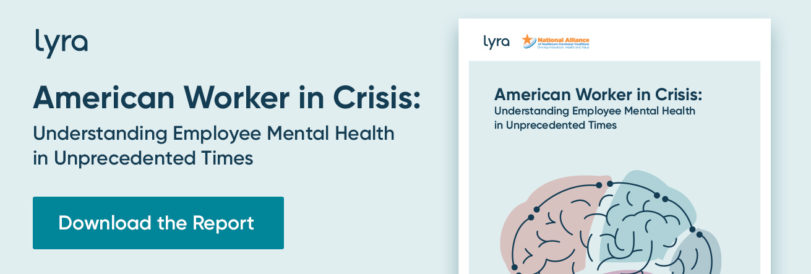The American Worker is Not Alright: Results of a New Nationwide Employee Survey
July 23, 2020
Loneliness, anxiety, burnout, and thoughts of self-harm are all startlingly common experiences for workers across the United States amid the historic uncertainty and social upheaval of American life in 2020, a new Lyra survey shows. The findings come as U.S. employees are grappling with an onslaught of unprecedented challenges, from coronavirus anxiety and economic instability to parents attempting the impossible, and the devastating effects of racial trauma.
To better understand how employees across the country are faring in the face of these extraordinary obstacles, Lyra partnered with the National Alliance of Healthcare Purchaser Coalitions to conduct a survey of U.S.-based employees. At the end of June, we asked over 1,200 workers with employer-sponsored health care coverage to tell us about their behavioral health symptoms, how they’re coping, and any employer support they receive for their mental health.
Their responses, partially summarized below, were eye-opening.
COVID-19, racial injustice, and financial woes all have direct impacts on employee mental health
Several months into the pandemic, the combination of health and financial crises and a nationwide reckoning with racism have all taken their toll on working Americans. Compared to the ongoing racial justice movement, the survey data suggests that the coronavirus pandemic has had a greater impact on the U.S. workforce; however, the results were surprisingly similar.
- 81% reported mental health issues related to the coronavirus pandemic
- 64% said they’d experienced mental health issues related to the recent racial justice movement
Money-related worries are compounding these problems, with 60 percent of respondents reporting negative mental health effects from financial stress.
Most workers are experiencing mental health issues, including life-threatening symptoms
Whether dealing with preexisting mental health conditions or facing new symptoms, most American employees have faced mental health struggles amid the turbulence of the last few months. The overwhelming majority of survey respondents (83 percent) said they’d experienced at least one mental health issue during the past three months.
- 62% are worried about their future
- 43% are sad
- 36% are angry
- 30% are lonely
- 30% are experiencing significant anxiety
- 30% are so stressed that it interferes with their work
The survey results also reveal an alarmingly high rate of workers experiencing more severe mental health symptoms: About one in 10 reported thoughts of hurting themselves or others in the last three months.
Mental health problems are affecting American employees' ability to work
As employees across industries are still adjusting to working during a pandemic, among other challenges, mental health challenges are significantly impacting them on the job. In fact, 65 percent said mental health issues are interfering with their ability to work, and 40 percent are dealing with burnout. This has implications for both employees and businesses, since untreated mental health problems can lead to absenteeism, presenteeism, and disability.
Many employees lack mental health resources and support
Although most workers are feeling adverse mental health impacts during this tumultuous time, many lack much-needed support to help manage these problems. Just one in seven respondents have received treatment from a mental health care provider in the past three months. Most of these employees reported paying out of pocket for this treatment–another potential roadblock for those who are unable or wary of paying for care in a time of economic uncertainty.
And while a growing number of companies does prioritize mental health support for their workforces, the study found that for many employees, this is not the case. Forty percent don’t believe their employer cares about their mental health beyond their ability to be productive, and one in four respondents said their employer doesn’t support their mental health at all.
Even more revealing is the effect this appears to have on workers’ attitudes toward their current jobs: Those who said their employers don’t support their mental health were twice as likely to be considering a career change.
What can employers do?
There are numerous factors beyond employers’ control related to workforce mental health, especially in tumultuous times. But as this study surfaces, there is a gap in employer-provided mental health support that employers have an opportunity to address.
Fortunately, research shows that treating mental health issues like depression and anxiety can lead to improved work performance and fewer missed workdays. Now more than ever, ensuring that employees have access to mental health care not only holds the potential to change lives, it can also go a long way toward preserving organizations’ most valuable resources–their people.
To see more the survey findings, insights, and best practices for employers to support workforce mental health in 2020, see the full report.
CONTACT US
If you want help connecting with a therapist, Lyra can assist you. You can get started today if Lyra is offered by your employer. Sign up now.
For employers who want to learn more about how Lyra addresses network adequacy and quality issues, download our white paper on quality or get in touch.
And check in frequently here or follow us on Facebook, LinkedIn, and Twitter for more insights into supporting employees’ mental health.
Explore additional blogs

Mental health at work
How to Spark Intrinsic Motivation on Your Team

Mental health at work
From Human Resources to Whole Humans: Rethinking Productivity With Trevor Noah

Mental health at work
